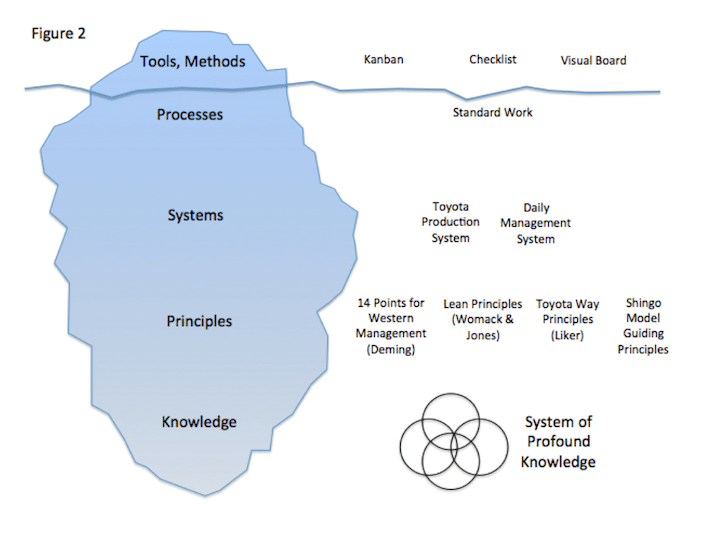By John Hunter, author of Management Matters: Building Enterprise Capability.
Mike Stoecklein presented his paper, Understanding and Application of Deming’s System of Profound Knowledge in Healthcare at the Deming Research seminar this year at Fordham University. This paper discusses the Healthcare Value Network’s Shingo-based assessment process (which has Deming-based principles) and provides examples of application from some of the Healthcare Value Network member organizations.
The prevailing style of management in healthcare is the same as the style described of Western management by Dr. Deming. (1,2) It is based on a short-term view, where management sees their job as achieving results by any means necessary. Committees and management batch problems for solving long after the problems have occurred, and the causes are commonly traced back to people. Management spends most of their time in boardrooms or conference rooms without any real understanding of the day-to-day operations, far removed from where the value is added (by the caregivers).
Healthcare managers have been led to believe that if they manage the parts of their organization well, then the parts will add up to a well-run organization. This reductionist view may work well for simple systems, but it produces poor quality, high costs, and a lack of cooperation when applied to complex systems like healthcare delivery.
This paper is useful for many reasons, including for those that think Deming’s ideas are about only managing a high volume faculty producing millions of the same product one after the other. That isn’t the case, but there are still people that have a misunderstanding on what Deming’s management ideas targeted. They targeted management of human organization not just factories.
Mike also references in his paper the main Deming ingredient missing from many “lean”/Toyota-Production-System efforts: understanding variation. He wrote a guest post here on that topic: We Need to Understand Variation to Manage Effectively.

Many organizations begin their journey in the “tools” category. While the use of tools can and does achieve results, the effort is difficult to maintain and often can become one of many “flavors of the month.” Some organizations may begin education and training programs for many people. While education systems are necessary to learn the new philosophy, large-scale education efforts without immediate opportunities for practice can result in wasted efforts and a false start.(35)
This is more profound than it may seem. Building a successful improvement focused organization is hard. Many organizations fail before they really have much success when they fall into one of the danger zones Mike mentions here.
Some healthcare organizations maintain Dr. Deming’s philosophy as part of what they do and have established quality departments that use the PDSA cycle for improvement. However, these actions alone will not address the prevailing style of management in healthcare, which is the same style described of Western management by Dr. Deming. Healthcare organizations need not continue to be managed in this manner.
The new knowledge that Dr. Deming introduced to the world is being re-introduced to some healthcare organizations that are serious about providing better value to patients and at an affordable cost. These healthcare organizations are learning about a model for better management from companies like Toyota that developed better results through ideal behaviors in what has been described as “lean”. What companies like Toyota have done is to actualize the principles which, minus the lean methods and systems, tend to remain abstract principles – powerful, but conceptual. (7)
Related: Fewer Patients-In-Process and Less Safety Scheduling; Incoming Supplies are Secondary – Standard Work Instructions are Continually Improved; They are not a Barrier to Improvement – Deming’s ideas and lean thinking share many similarities (and some differences)


